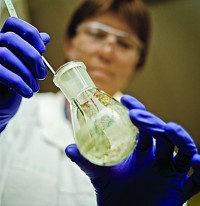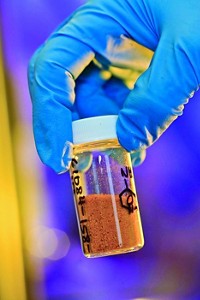Advertisement
Grab your lab coat. Let's get started
Welcome!
Welcome!
Create an account below to get 6 C&EN articles per month, receive newsletters and more - all free.
It seems this is your first time logging in online. Please enter the following information to continue.
As an ACS member you automatically get access to this site. All we need is few more details to create your reading experience.
Not you? Sign in with a different account.
Not you? Sign in with a different account.
ERROR 1
ERROR 1
ERROR 2
ERROR 2
ERROR 2
ERROR 2
ERROR 2
Password and Confirm password must match.
If you have an ACS member number, please enter it here so we can link this account to your membership. (optional)
ERROR 2
ACS values your privacy. By submitting your information, you are gaining access to C&EN and subscribing to our weekly newsletter. We use the information you provide to make your reading experience better, and we will never sell your data to third party members.
Business
Big Pharma Regroups
Drug companies' third-quarter results provide an early glimpse of life under new leaders
by Lisa M. Jarvis
November 20, 2006
| A version of this story appeared in
Volume 84, Issue 47
Several major pharmaceutical companies spent the third quarter watching generic drugs sink their teeth into blockbuster products. U.S. firms have had a particularly hard time launching new drugs to offset such competition, but a shift in leadership at three of them could signal a new resolve to improve financial performance to meet investor expectations.
The average third-quarter profit margin for the 12 large companies tracked by C&EN inched up slightly to 26.9%, compared with 26.2% in the third quarter of 2005. Average sales growth came in at 5.1%, and earnings grew 7.6%.
European drug companies generally fared better than their U.S. counterparts. Average third-quarter earnings growth among the European majors came in at a respectable 10.7%; sales growth was modest at 5.2%. Profit margin improved to 33.9%, compared with 32.2% in the third quarter of 2005.
Accustomed to double-digit sales and earnings growth, and at the very least counting on high single-digit growth, the eight U.S. drug majors tracked by C&EN came out of the period with combined earnings growth of 4.7% and a 5.1% increase in sales. Third-quarter profit margins among U.S. companies slipped to 22.1% from 22.2% in the 2005 period.
With new chief executive officers at three U.S. pharmaceutical companies—Bristol-Myers Squibb, Merck, and Pfizer—the quarter brought a first look at how the industry might adapt to a tougher competitive environment.
The most recent management shake-up came at the tail end of the third quarter, when Bristol-Myers Squibb dispensed of CEO Peter Dolan after the company was sideswiped by the unexpected launch of a generic version of its top-selling drug, Plavix.
The Plavix debacle, combined with generic competition for the cholesterol-lowering drug Pravachol, resulted in a hard hit to BMS's third-quarter results. Earnings plummeted 27.2% to $438 million, and sales fell 12.9% to $4.15 billion. For the first nine months of the year, earnings were off 20.4% to $1.76 billion, while sales slid 3.4% to $13.7 billion.
Sales of Plavix plunged by 36% in the third quarter to $630 million, as generic product took hold in the market. The blood thinner, which pulled in $3.8 billion in 2005 sales, was expected to have patent protection through 2011. However, BMS and its marketing partner for Plavix, Sanofi-Aventis, were caught off guard when Apotex flooded the market with the generic, clopidogrel, after a court rejected a patent suit settlement between the three companies.
BMS eventually won an injunction that barred the sale of the generic until patent litigation could be resolved, but in the meantime, Apotex had 23 days to speed product to pharmacies and distributors.
In just a few weeks, the damage to the BMS franchise was done. Total U.S. prescriptions for clopidogrel, both branded and generic, were up 14% in the third quarter of 2006, but demand for Plavix alone fell by 32%. BMS estimates the early launch of the generic product cost it between $525 million and $600 million in the third quarter, and the firm expects there is sufficient Apotex product on the market to last into the first quarter of 2007.
BMS should see a recovery when generic supplies run out by the end of the first quarter. "We expect earnings to rebound quickly in 2007 as the supply of generic Plavix is exhausted," says Bank of America stock analyst Chris Schott.
Deutsche Bank analyst Barbara Ryan notes, however, that even in the best-case scenario—under which generic Plavix does not have a big impact on first—quarter sales and BMS eventually wins the patent trial-long-term growth prospects for the drug are still uncertain. Lilly is expected to launch its own blood thinner, known by the generic name prasugrel, in the second half of 2008. Depending on the outcome of a Phase III trial comparing prasugrel and Plavix, scheduled for mid-2007 completion, Plavix could be facing "tremendous competitive pressure," Ryan says.
The Plavix situation has diverted attention from the lukewarm performance of other important BMS products. Worldwide sales of Pravachol, which lost patent protection in April, were down 64% in the quarter to $192 million. Meanwhile, growth of the schizophrenia drug Abilify, though still strong, has recently started to decelerate. The drug brought in $313 million in third-quarter sales, a 20% increase over the year-ago period.
Furthermore, the new products that BMS hopes will drive growth in the future did not leave the gate as strongly as analysts had expected. The arthritis drug Orencia brought in $34 million in sales in the quarter, less than half of analysts' forecasts, and sales of the cancer drug Sprycel were just $11 million, which was also below expectations.
Sales of Erbitux, which BMS jointly markets in the U.S. with ImClone Systems, were up a healthy 64% to $175 million, but the cancer treatment will also face new competition in 2007. Amgen recently gained approval for Vectibix, an antibody that, like Erbitux, blocks the epidermal growth factor receptor, but it will be priced 20% lower than Erbitux.
Though speculation abounds about the future of BMS in the aftermath of the Plavix scandal, interim CEO James M. Cornelius told analysts in a conference call about the third quarter that the company is "not for sale." However, he also indicated that it will consider any offers that come its way.
Pfizer's results provided an early glimpse into new CEO Jeffrey B. Kindler's plans for the company. Third-quarter sales were up 9.0% to $12.3 billion, and earnings increased 6.6% to $3.92 billion.
Sales of the cholesterol-lowering drug Lipitor, up 15% in the quarter to $3.3 billion, did not appear to be dampened by the launch of generic versions of Merck's cholesterol drug, Zocor. However, Lipitor benefited from increases in inventory levels and the resolution of a pricing dispute. Actual U.S. prescriptions for Lipitor fell 3% in the quarter.
Pfizer's sales of newer drugs were strong. The nerve-pain treatment Lyrica brought in $340 million, compared with $80 million in the third quarter of 2005, and the schizophrenia drug Geodon logged $201 million in sales, a 36% increase. The cancer drug Sutent, launched in January, pulled in $63 million.
Despite these bright spots, Pfizer said sales will be flat over the next two years, due to competition on older products, a tougher pricing environment, and the strengthening of the dollar. Kindler said the company will embark on a new cost-cutting initiative that expands on its previous goal of saving $4 billion by 2008.
Analysts were impressed with Kindler's candidness about the need to restore the firm's credibility. According to Ryan, Pfizer managers "offered a more realistic and credible outlook and agenda, acknowledging the challenges it faces and defining in very broad terms the aggressive and necessary cost-cutting measures that will need to be implemented to improve the earnings outlook."
Ryan noted that restructuring, which includes overhauling manufacturing networks, is a growing theme not just at Pfizer, but across the industry. "We suspect the industry is in the early phases of an iterative process which could fundamentally change the industry's cost structure," she said.
Merck, which has been under new leadership for roughly 15 months, could provide some hope for Pfizer and BMS as they look to regain their former luster. Despite the loss of patent protection on Zocor, its top-selling drug, Merck managed to offer relatively healthy results due to strict cost-cutting efforts and the launch of five new products.
Merck's third-quarter earnings slid 21.5% to $1.11 billion based on virtually flat sales of $5.41 billion. Sales of Zocor, which went off patent at the end of the second quarter, plummeted 65% to $371 million. However, that loss was partially offset by growing sales of Zetia and Vytorin, which are logged by the company's cholesterol joint venture with Schering-Plough. Zetia sales increased 41% to $502 million, and Vytorin brought in $527 million.
Benefiting from an unusually strong allergy season, Singulair posted a 25% third-quarter sales increase to $868 million.
Merck's three new vaccines also were strong performers. Gardasil, the cervical cancer vaccine that was approved in June, brought in $70 million in its first quarter on the market, and analysts think it could top $200 million for the year. Rotateq, a rotavirus vaccine, had sales of $62 million, and the shingles vaccine Zostavax tallied up $10 million in sales.
The company also recently added two new drugs to its roster. Emend, approved in July to treat post-operative nausea, had third-quarter sales of $41 million. And the type 2 diabetes drug Januvia was approved last month and is expected to have peak sales of more than $1 billion.





Join the conversation
Contact the reporter
Submit a Letter to the Editor for publication
Engage with us on Twitter